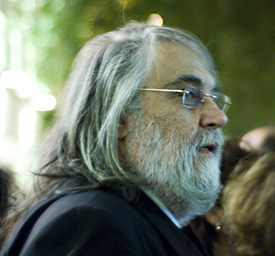Vangelis

Vangelis: The Sonic Voyager of Our Time
By Conrad
Evangelos Odysseas Papathanassiou, better known by his professional moniker Vangelis, was a towering figure in modern music—a composer whose work spanned not just genres, but galaxies. From his roots in Greece to the global stages of electronic and cinematic music, Vangelis redefined what it meant to compose in the age of synthesizers and space exploration.
Born on March 29, 1943, in Agria, Greece, and raised in Athens, Vangelis was a self-taught musical prodigy. He began his career in the 1960s with rock bands like The Forminx and Aphrodite’s Child—the latter producing the now-iconic psychedelic rock album 666 in 1972.
But it was his solo work, particularly in film scoring and electronic music, that cemented his legacy.
A Cinematic Legacy
Vangelis achieved international fame with his Academy Award-winning score for Chariots of Fire (1981), whose main theme became a cultural touchstone and topped the U.S. Billboard Hot 100 chart. The emotive, synthesizer-driven melody became synonymous with triumph and perseverance, forever linking his name to cinematic greatness.
His other film scores include:
- Blade Runner (1982) – A haunting, futuristic soundtrack that remains one of the most influential in science fiction cinema.
- Antarctica (1983), The Bounty (1984), and 1492: Conquest of Paradise (1992) – The latter saw massive European commercial success and a Golden Globe nomination.
- Alexander (2004) – A sweeping epic befitting its subject.
- Cosmos: A Personal Voyage (1980) – His work for Carl Sagan’s documentary helped make science feel spiritual.
The Experimental Years
During the 1970s and 1980s, Vangelis also released a number of groundbreaking solo albums, operating from his custom-built Nemo Studios in London. These albums explored the frontiers of electronic, ambient, and symphonic music:
- Heaven and Hell (1975)
- Albedo 0.39 (1976)
- Spiral (1977)
- China (1979)
- Direct (1988)
- The City (1990)
Vangelis also joined forces with Jon Anderson, the voice of progressive rock band Yes, to form Jon and Vangelis, producing several successful albums blending electronic and vocal elements.
His collaborations with Irene Papas, focusing on Greek traditional and religious music, showcased his versatility and deep cultural roots.
A Voice in the Cosmos
Vangelis was not just a composer of music, but of moods, of universes. In the later stages of his career, he forged a unique connection with space agencies like NASA and ESA, producing works that seemed to echo the very essence of the stars:
- Mythodea (1993, later re-released in 2001 for the Mars Odyssey mission)
- Rosetta (2016) – A musical tribute to the ESA Rosetta spacecraft mission
- Juno to Jupiter (2021) – His final studio album, dedicated to NASA’s Juno mission
A Prolific Catalog
Across over five decades, Vangelis composed more than 50 albums, including a staggering array of studio and soundtrack work:
Studio Albums Highlights
- Fais que ton rêve soit plus long que la nuit (1972)
- Earth (1973)
- Beaubourg (1978)
- Soil Festivities (1984)
- Voices (1995)
- Oceanic (1996)
- El Greco (1998)
- Nocturne: The Piano Album (2019)
Major Soundtracks
- L’Apocalypse des Animaux (1973)
- La Fête sauvage (1976)
- Opéra sauvage (1979)
- Chariots of Fire (1981)
- Blade Runner (1994 official release, 2007 anniversary edition)
- 1492: Conquest of Paradise (1992)
- El Greco (2007 – Original Motion Picture Soundtrack)
- Chariots of Fire – The Play (2012)
Legacy and Passing
Vangelis passed away on May 17, 2022, in a hospital in Paris at the age of 79, due to heart failure. But his influence continues to echo through every composer who blends the digital with the divine, the scientific with the spiritual.
He was a “one-man quasi-classical orchestra,” often recording compositions live, in a single take—letting emotion and intuition guide his fingers across an array of synthesizers.
More than just a musician, Vangelis was a sonic voyager, a dreamer whose music helped humanity feel closer to the stars, to our histories, and to each other.
Thank you for reading,
Conrad
